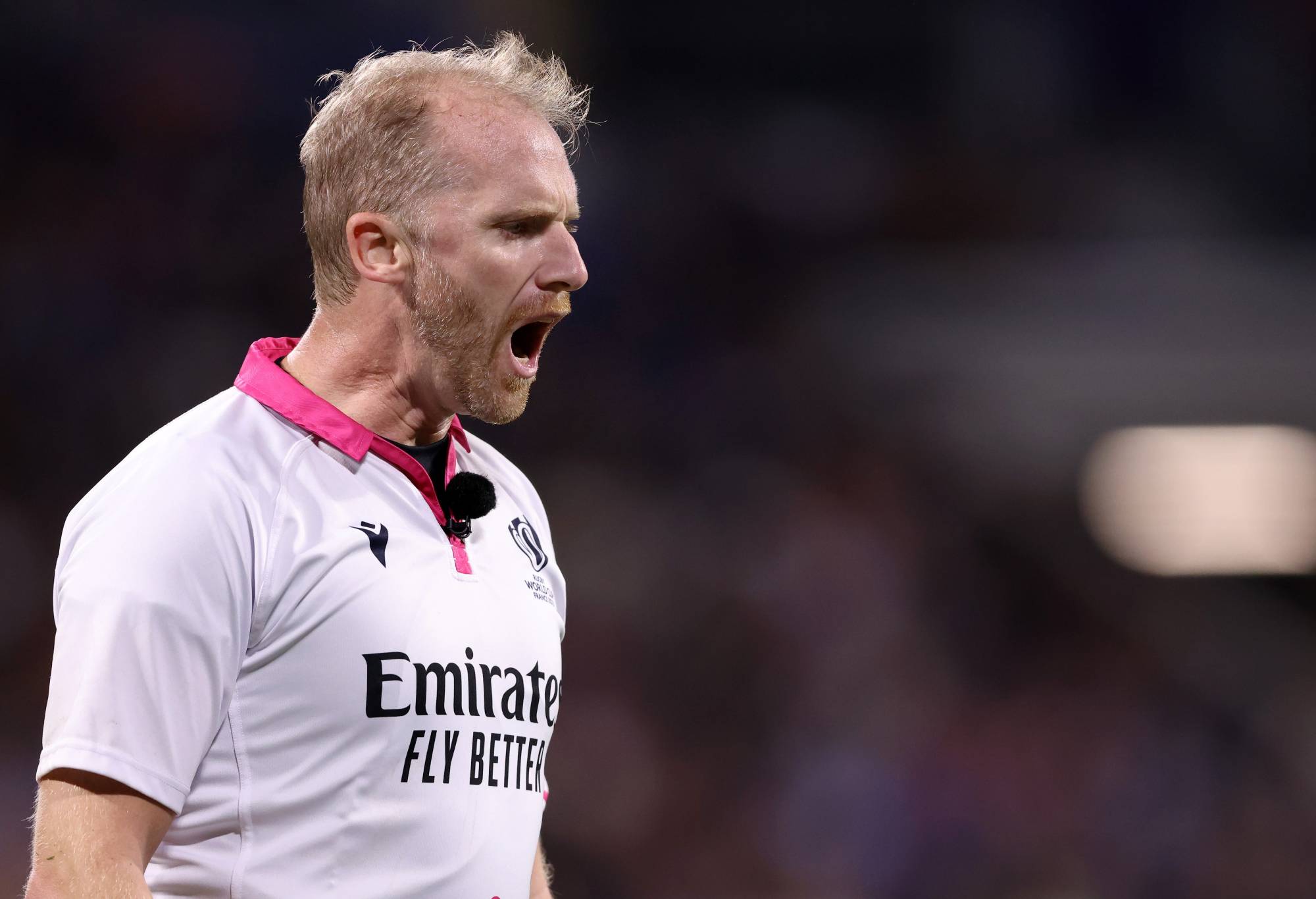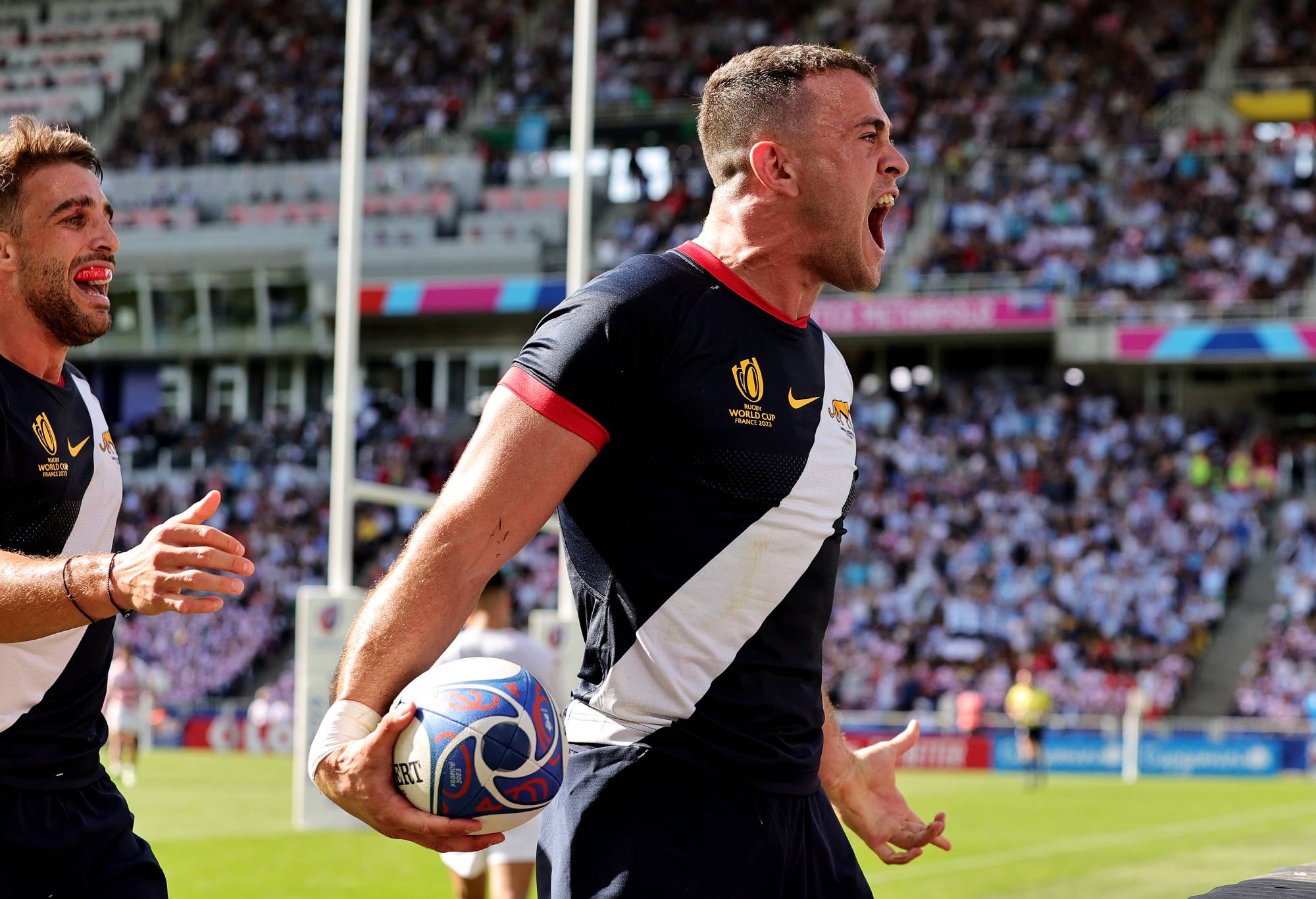In the 68th minute of a Bledisloe Cup match in Brisbane in 2020, referee Nic Berry blew a knock-on against Wallabies halfback Nic White for a fumble at the base of a ruck.
During a short break in play that followed, TMO Paul Williams alerted Berry to the fact that the ball had in fact been tipped out of White’s hands by a prone Scott Barrett. Berry took in a few replays on the big screen, duly awarded the Wallabies a penalty, and issued Barrett with a yellow card.
The moment was hailed by observers as a good thing for the game; the 4th official interjecting to provide a fair and just outcome. I took the opposite view at the time, not because I wanted to see cynical actions like Barrett’s rewarded, but because of warning that any pursuit undertaken by rugby to fill the game with perfect outcomes would be doomed
to fail, and would risk changing the nature and character of the sport, in a negative way.
Just three years later, it feels like the situation I was warning of has arrived. In its futile mission to fill the game with perfect outcomes, World Rugby has now, almost by stealth, determined that rugby has two referees.
Over the course of this tournament, just like many of the competing nations have done, match officials have grown in familiarity and confidence in their teamwork and communication. The match referee has the TMO constantly in his earpiece, trawling 20 or 30 seconds behind the action, offering a word of affirmation here, or requesting a pause there, to check off something that has caught the eye on the bank of monitors in front of him/her.
Today, a rugby match is an environment where players know they cannot possibly hope to get away with anything unlawful. “Maintain your discipline” is a constant catch-cry from coaches. Big Brother is omnipresent.
Yet, because perfection is fool’s gold, because no matter what monitor 17 might suggest, because there are still subjective decisions to be made; the game, and the fans who watch it, is now on the verge of being treated with contempt. Something that has been brewing over the course of this cup, burst open over the weekend.
Even Wayne Barnes, a confident referee renowned for backing his own decisions, was noticeably working in tandem with TMO Marius Jonker, during Thursday night’s New Zealand versus Uruguay match.

Referee Wayne Barnes looks on during the Rugby World Cup France 2023 match between New Zealand and Uruguay at Parc Olympique on October 05, 2023 in Lyon, France. (Photo by Paul Harding/Getty Images)
Jonker did exactly what he needed to do early, ruling out tries to New Zealand’s Cameron Roigard, and Uruguay’s Manuel Ardao. No problem; everyone is happy for the TMO to prevent tries being awarded when the ball is dislodged before forcing, or when the try-scorer has a foot in touch.
Things got murkier when Jonker rubbed out a try to Damian McKenzie, deeming that Richie Mo’unga, in the act of cleaning out at a ruck, had executed a neck roll. Another view might have had Mounga’s arm slipping up and making contact with his opponent’s neck; which is not the same thing.
Jonker was on duty again the next night, in Lyon, where Italian prop Simone Ferrari had his own try rubbed out after Jonker found he had made high contact in a clean-out in the previous phase.
Watching the replay, referee Karl Dickson and his two assistants came to the obvious conclusion that Ferrari had made contact with his opponent across the chest, and that any subsequent high contact was incidental.
Incredibly, Jonker then agreed with Dickson and his assistants, which begs two questions.
Does rugby really want to see tries taken away from teams because, in the lead-up, under microscopic attention, an action is found to be, not foul or dangerous play, but technically penalisable?
And, does rugby accept the involvement of TMOs for incidences which they themselves, under pressure, walk back from? Mr Jonker, if this act was not serious and not dangerous, and had no material bearing on the scoring of the try, why on earth were you stopping the game?
Incredibly, on Saturday, it got worse.
With Samoa leading England by 14-8, TMO Brian MacNeice pointed referee Andrew Brace to a potential knock-on in the lead-up, some 1 minute 34 seconds after the try was scored, and after Lima Sopoaga had attempted the conversion.
Several viewings later, I found it impossible to determine whether or not the ball was knocked on, or knocked backwards by Maru Itoje. Where was MacNeice applying the ‘clear and obvious’ benchmark that officials apply?
Make no mistake, this was not a case of the TMO assisting the match referee, calling out an important or material omission, or clarifying something upon request. This was a second referee re-officiating play that had already been refereed, in this case offering a different opinion to the first referee.
Not on a matter of foul or dangerous play. Just whether or not a ball may have been nudged forward or not in amongst a forest of arms.
In all, MacNeice intervened or was asked to intervene in the match, no fewer than seven times. Total time off during those interactions and reviews, was 8 minutes, 45 seconds.
Where do we get our time or money back?
With most people in rugby keen to see matches sped up, or total match times shortened, or both, listen to how MacNeice, in the adjudication of Nigel Ah Wong’s second try, actually tells Brace, “We’re going to get an angle to show exactly what’s happened here. We’re going to go very slowly.”
Perhaps that means nothing more than ‘let’s be careful to get this right’? Even so, it’s an unfortunate choice of words by MacNeice. Is it not possible to utilise technology for increased accuracy, AND simultaneously be conscious of keeping stoppage time to a minimum?
What is ironic is that many of these interventions are being made under the pretext of making the game safer. But as Ian Foster and Eddie Jones, among others, have pointed out, the high number of stoppages, and the length of stoppages, only serves to favour the power game. Even bigger and stronger athletes, even more collision force.
In both senses; that emphasis pushes rugby closer and closer towards American football. Shorter bursts of higher power play, and elongated match times, as officials debate the minutiae of every little happening.
All in the vain search for perfection.
Vain because, even with all of the technology at his disposal, the TMO in Paris on Saturday night, Australia’s Brett Cronan, somehow determined that Ireland fullback Hugo Keenan did not put his foot on the touchline, when there was clear vision to say that he did.
One James Lowe left-foot special later, Scotland were 50m downfield, bumbling a defensive lineout, instead of launching an attacking move.

PARIS, FRANCE – SEPTEMBER 23: Johnny Sexton of Ireland celebrates victory after defeating South Africa during the Rugby World Cup France 2023 match between South Africa and Ireland at Stade de France on September 23, 2023 in Paris, France. (Photo by Laurence Griffiths/Getty Images)
Let’s be clear, I’m not advocating for that particular wrong foisted upon Scotland to be righted. That was the task of Australian assistant referee Jordan Way.
And that’s the point; the price paid for a TMO to hold up play just to advise the referee that player x stepped on the touchline, or that player y tipped the ball out of the halfback’s hands, is simply too high.
Because, if it is impossible to fix every single error, to everyone’s satisfaction, in every single match, then how is it acceptable to fix some but not others?
This is exactly where claims that second tier or Pacific Island nations always get the rough end of the stick come from. While there is no conspiracy, it is easy to see why such inconsistent application breeds such discontent.
How can the game ever be made truly fair? Why can’t people accept that in a dynamic game overseen by a massively complex law book, open to subjective interpretation, there will always be calls that go for your team, and calls that go against?
For a solution to make sense, there must first be understanding and agreement around what kind of game the lawmakers want rugby to be.
Unless there is a desire to make rugby more like Gridiron – who thinks that’s a good idea? – then the TMO’s wings must be clipped. Limit involvement to confirmation of grounding and touch in try-scoring situations. Ditto offside and obvious forward passes in try-scoring situations.
Narrow the definition as to what constitutes foul and dangerous play instances for which the TMO can intervene.
Dangerous and reckless foul play that warrants a yellow or red card, yes. Lower-level contact that TMOs themselves agree only warrant a penalty, no.
There is an old saying in rugby that when you don’t notice the referee, you know that the ref has done a good job.
That saying was never intended to mean that the reason you don’t notice the referee is because you notice the TMO instead.
With the quarterfinalists now decided, all eyes turn to some mouth-watering match-ups, next weekend. That’s actually an unintended benefit of World Rugby’s draw disaster; instead of each match having a clear favourite, in line with current seedings, all of the matches – the ‘A’ division in Paris, the ‘B’ division in Marseilles are intensely competitive.
Argentina and Fiji were the last two confirmed, the former after a hugely entertaining and exciting game in Nantes, where both sides did the early start and perfect conditions, full justice.

NANTES, FRANCE – OCTOBER 08: Emiliano Boffelli of Argentina celebrates after scoring his team’s fourth try during the Rugby World Cup France 2023 match between Japan and Argentina at Stade de la Beaujoire on October 08, 2023 in Nantes, France. (Photo by David Rogers/Getty Images)
There were some terrific tries scored by both sides, but none more thrilling than the effort of big Amato Fakatava, rumbling 60 metres, including an audacious chip and regather, after Japan had shifted quick turnover ball. Hands down, the try of the tournament.
And while Fiji did enough to qualify, what wasn’t there to love about Portugal’s brave, crazy and skilful win, 24-23, their first ever in a World Cup?
So, after a wretched World Cup that, in all truth, went off the rails for the Wallabies not in Saint Etienne against Fiji, but nine months ago, Australian rugby enters a critical juncture.
That’s a subject for another day, and many more days after that, no doubt. But for now, the Wallabies are officially out of their tournament and ready to catch a plane home.
It’s hard not to wish that the TMOs were on the same flight out of France.































































































